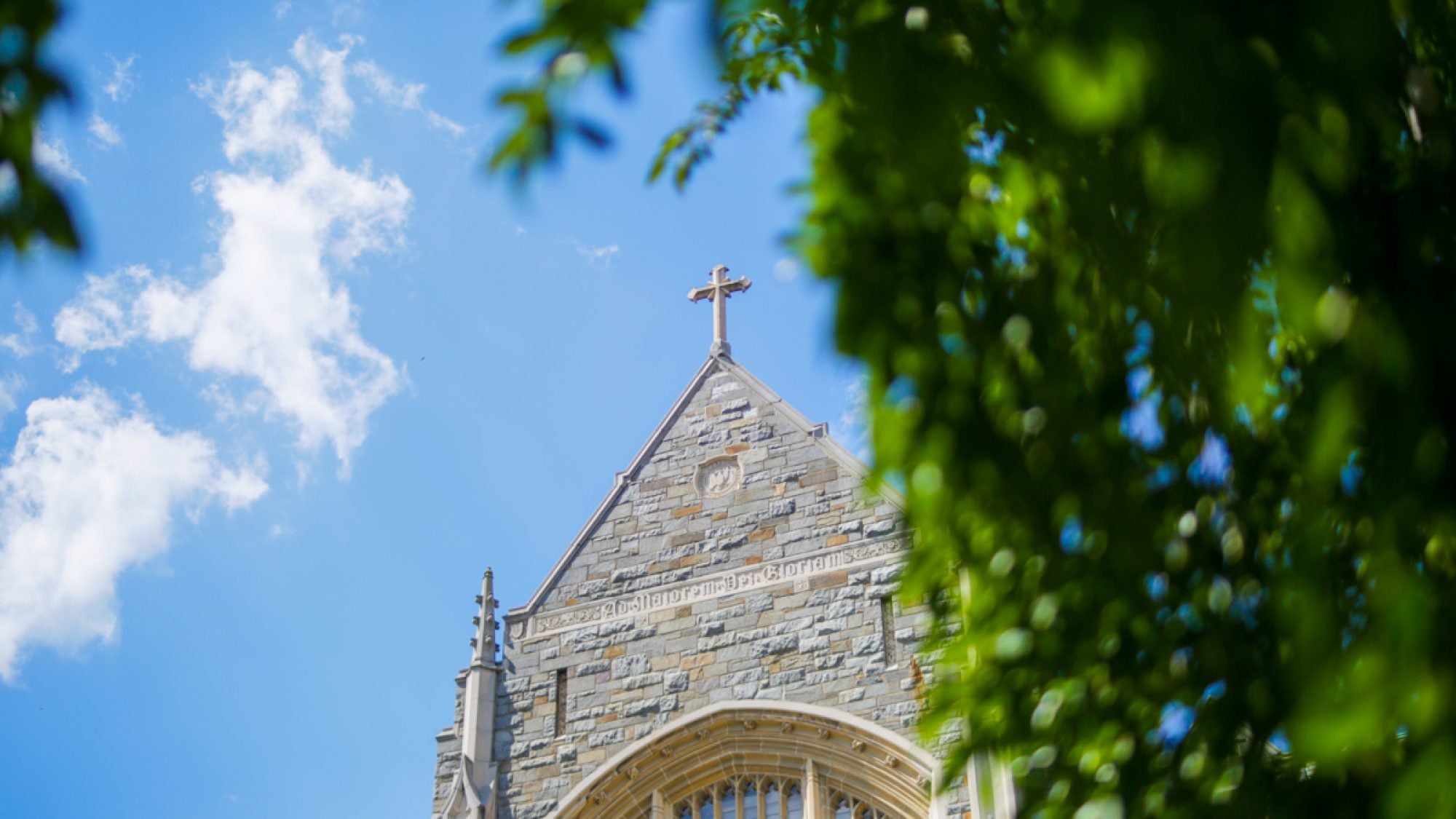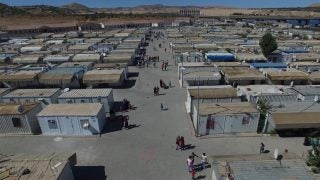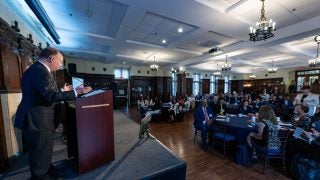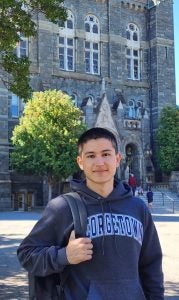
Asadullah Azimi (C’27) remembers what it was like living as a refugee in India.
He had left his home country of Afghanistan with his mother in 2019 and hoped to go to college in India. He couldn’t enroll in school there without a student visa, so he pursued his passion instead, teaching himself to code from videos on YouTube.
The world, he said, felt “blurry and dark. There was no opportunity to work hard and build a better future.”
Three years later, Azimi learned of a program developed by the educational technology company Duolingo and the U.N. Refugee Agency (UNHCR) that guides refugees through the university and financial aid application processes.
Through the program, Azimi discovered Georgetown and was drawn to its Washington, DC, location. In 2022, he was accepted.
Azimi now studies computer science at Georgetown, where he applies his coding skills in a neuroscience lab and is an active member in the Georgetown Scholars Program (GSP), a support network for first-generation and low-income college students. His outlook, he said, has transformed.
“Being at Georgetown has helped me gain practical skills and connections that are opening doors I never thought possible,” he said. “I now have a clear vision for my future and am excited about the possibilities ahead, something that was hard to even imagine when I was in India.”
Azimi was part of the first cohort of students to enroll in Georgetown through the university’s partnership with Duolingo and the UNHCR. The program is one of many ways Georgetown is working to support students and faculty from areas of conflict and ensure they have the community and resources to flourish — particularly as the global refugee population rises.
“The education of future generations is even more urgent at a time of increased conflicts around the world,” said Thomas Banchoff, vice president for global engagement. “That is why Georgetown is committed to seeking ways to support the global mobility of students and scholars alike.”
Welcoming Refugee Students
In 2023, the refugee population increased to 43.4 million people worldwide — a 7% increase over the previous year, according to a 2024 report from the UN Refugee Agency. Escalating violence and conflict in areas around the world such as Sudan, Syria, Ukraine and Palestine; human rights violations in Haiti; and insecurity, including climate-related hazards in Somalia, have all continued to displace people and require humanitarian assistance, the report shared.
Confronting a world in conflict, Georgetown has formed partnerships with two programs leading the way in supporting refugee students: the U.S. Department of State’s Welcome Corps on Campus, which welcomed the first cohort of refugee students to Georgetown this fall, and the Duolingo and the UNHCR program, which welcomed its second cohort.
Laura Kaub, program director of DETxUNHCR and Azimi’s university advisor, said she appreciated Georgetown’s partnership, transparency and accessibility in the admissions process.
“We’ve been so privileged and happy to consider Georgetown a partner in this work,” Kaub said. “Because we’ve gotten to understand what Georgetown is looking for, we can determine which of our students, in terms of their skills, experience and goals makes them the right fit for Georgetown. That is winning for us, and that is winning from the admissions side.”
After arriving at Georgetown, Azimi faced new challenges in adjusting to American culture and the educational system. To help with the adjustment, he joined the Georgetown Scholars Program (GSP), a program that helps ease the transition for first-generation and low-income college students and navigate their academic career.
Through GSP, Azimi learned not only to leverage helpful resources on campus, but he also built his own community network. He is now mentoring first-year GSP students who were once in his shoes.
“GSP has given me both academic resources and a network of mentors and peers who truly understand the challenges I’ve faced as a first-generation and international student,” he said. “This has made me much more confident in my ability to achieve my goals and create a future that once seemed unreachable.”
Azimi hopes future refugee students who come to Georgetown through his program will not only study and find support while on campus, but also think about students “still stuck in other countries and try to come up with initiatives and solutions to help these students gain access to university and navigate the college process.”
Supporting International Students and Scholars
As autocracy, political extremism and polarization around the world has risen, Georgetown has also prioritized the safety and security of students and scholars from areas of conflict.
The university is a member of groups such as the Scholars at Risk Network and the New University in Exile Consortium.
In 2022, shortly after Russia’s full-scale invasion of Ukraine, alumni Antonio Gracias (SFS’92, MSFS’93) and Sabrina Kuhl Gracias (B’93) established a scholarship fund to support the academic and personal financial needs of current and future students impacted by the war. Since then, the Gracias Family Sunflower Current Use Scholarship Fund has supported 21 Ukrainian students at Georgetown, including undergraduates who demonstrate financial need, as well as merit-based scholarships for graduate students in the School of Foreign Service (SFS).
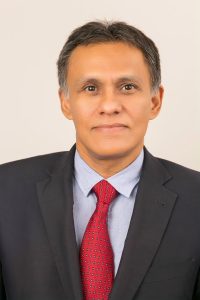
In 2022, Georgetown also welcomed Jorge Huete, one of Central America’s top biotechnology scholars, who had been displaced from Nicaragua due to the country’s sociopolitical situation.
A passionate advocate for the role of science in developing countries, Huete had worked to expand molecular research in sustainability, biomedicine and the environmental sciences in Nicaragua. With the support of a large grant, he established a lab and promoted the development of biotech research. He eventually became the founding president of the Academy of Sciences of Nicaragua and vice president of the Jesuit University of Central America.
However, Huete’s leadership roles also made him a target of government threats. In 2022, he tried to return to Nicaragua from a conference in Argentina. He was denied from boarding the plane. While not entirely unexpected, as similar incidents had happened to other scholars and intellectuals, the incident was still a shock, Huete said.
“I can’t go back to my home, my life, my job of 20 years,” he said. “[I was] left without a job, just a little suitcase and stranded in a foreign country.”
Huete decided to look for work in the United States, and was attracted to Georgetown’s traditions of training, research and practice in science policy, he said. He eventually joined the faculty of the School of Foreign Service’s Science, Technology and International Affairs Program and was welcomed by President John J. DeGioia.
Last fall, Huete established the first science policy development workshop focused on Central America at Georgetown. This fall, he is teaching classes ranging from global science diplomacy to biotechnologies for development. After a year and a half here, he feels settled. He doesn’t anticipate returning home, where his 10 brothers and sisters still live, any time soon. Still, he stays positive, and encourages other displaced scientists to do the same in their new environments.
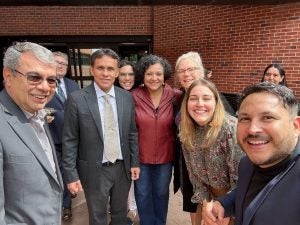
“Think of how to use your background to grow and take advantage of opportunities you may not have had,” he said. “In spite of the frustrations of being displaced, you can still contribute to the development of the sciences and the benefit of humanity.”
Vanessa Meyers, director of Global Services, emphasized the important perspectives, ideas and contributions international students and scholars bring to the Georgetown community.
“International students and scholars enhance Georgetown University by bringing diverse perspectives that align with our Jesuit values of global solidarity and social justice,” she said. “Their presence enriches our community, reminding us that true education embraces the wisdom of all and fosters a global sense of shared responsibility.”
Programs and Events Raising Awareness
Georgetown’s schools and academic programs are also working to support displaced students and faculty, from hosting events to offering inaugural degree programs that bring attention to areas of the world in conflict.
The Center for Contemporary Arab Studies (CCAS) recently raised funding to support four new scholarships for graduate students who were living in Gaza. As of April of this year, 80% of schools in Gaza have been damaged or destroyed, according to a United Nations article. Three of the students are pursuing their master’s in Arab Studies on the Hilltop, and the fourth student is still in Gaza. The center helped recruit students and support their and their family’s journey to Washington, DC.
“What has been striking about bringing these students is how the community has reached out,” said Rochelle Davis, director of Graduate Studies for CCAS.
Students, alumni, faculty and staff have assisted with housing, health care, administrative forms, dinners and community, Davis said. Two staff members met families as they arrived at their airport.
“We can’t change their realities in these conflict situations, whether they’re from Sudan or from Kakuma, but we can be there for them and be there with them,” she said. “Learning from the Jesuits, we’re accompanying people.”
Throughout the 2024-2025 academic year, the African Studies Program, the CCAS, the Master of Arts in Conflict Resolution program and the Georgetown Institute for Women, Peace and Security, are focusing on the crisis in Sudan through a series of Keep Eyes on Sudan events, which featured an event on mass displacement, food insecurity, and Sudanese women this fall, moderated by Abdullahi Halakhe, adjunct professor in the School of Foreign Service.
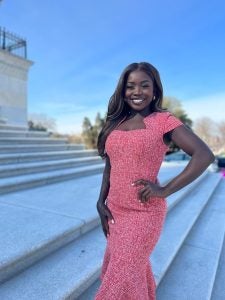
The Institute for the Study of Migration is also offering a new master’s degree in international migration and refugees to address the pressing challenges arising from population movements.
Sinait Sarfino (G’26), a former refugee from South Sudan, is a member of the degree program’s first cohort of students. She hopes that by joining this program, her voice and her family’s voices can be heard. Sarfino emphasized that degree programs like Georgetown’s play a critical role in humanizing migrants and refugees.
“People look at numbers and make decisions but don’t realize those numbers are lives,” she said. “We need to humanize the situation and think about solutions.”
By Julia Murillo
